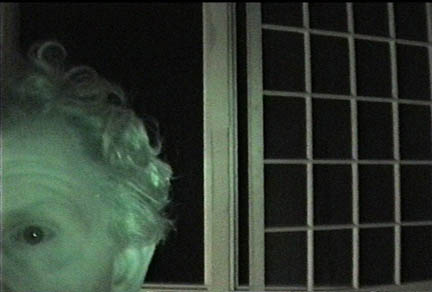Road Work
still from video and statement

(still from Road Work)
"you needn’t laugh,"
he said. "I’m not religious; I’m studying the road to holiness
to see if it might be also be possible to drive a car on it!"
Robert Musil / The Man Without Qualities
ROAD WORK
prologue:Metal Fatigue
a video by Public Domain, Inc. (in this case, Robert Cheatham adn chea
Prince)
We move continuously, we packs of refugees, nomadic hoardes, roaming from
place to place; riven on rivers of metal, plastic, and concrete, we twist
through day and night, through place and time. We exist in a daze of confusion,
information streaming continuously: radio in one ear, cell phone in the
other. Neither here nor there (where then? where are we drifting??) absent,
we slide continuously, voyaging continuously, but never seeming to GET
anywhere, roaming further and further adrift from ‘home’ (and
where is that now? mostly in the cushion under us, mostly past the next
intersection, mostly ‘back there’ or ‘up ahead’).
All work now is road work, the work of navigation, of movement, of increasing
the speed, of speeding up the time(s), of upping the ante, all work now
is the work of transit and maybe not even that: maybe just a MAP of the
transitioning.
The impact of day lends sight lines to catastrophes of the day, myriad
impacts ‘on the road’ from the micro-meteoric to the global.
We function always and everywhere now under the sign of alibis for absence,
phone lines and automobile both disappearing into a vortex of liminal
conditions and and then even further, falling off the lip of the daytime
world (except now not having any place to fall TO, just constant free
fall).
But the prosthetic eye we carry with us and with increasing frequency
-- what of it’s proportionality? (does it even ‘carry’
a dialectic anymore, can it distinguish one? good vs evil? Here versus
there? This versus that? Hasn’t the machine, these electronic eyes,
these mechanical feet, put all that into motion also, on their own journeys?)
Does it, the machine I mean, does it have a need for night? (It’s
night vison inexorably CONVERTS night to day, not the same as inhabiting
the night -- and of course machines have no need of habitation, day, or
night; they train us now on our new voyages not to need either/any of
that. Sleepless, eyeless/full, feetless we begin to move smoothly through
a greased middle universe (traditionally the middle regions are the realm
of the daemonic, midway between gods and men; perhaps now we have no need
of that, we have the Universal Machine, the computer, which lies in that
middle kingdom)...who knows what other creatures we will meet in this
middle kingdom, always previously a place of fabulous voyages, exploits,
and creatures! We may even come to the point of CREATING ourselves as
fabulous creatures, liberating the RuPaul in all of us, tipsy on our mechanical
nano-high heel red Dorothy shoes...CLICK CLICK! Here we go!!)
The story of the day is no longer able to hide from the night; nor can
the night take refuge from the glaring eye of the day. The face of the
day (and the stories and the fate which that face tells) is always one
of a levinasian openness. But the unblinking non-faced lense of the video
continuously reads that openness, folding it inot archives ready for inspection,
collapsing innerspace into worldspace, cannily prying open skotomas (what
is a ‘personality’ but the dark porous membrane between inner
and outer?).
The lense no longer respects that division, instituing a generalized ‘mechanical’
catastrophe on the stage of representations and that which is represented;
the lense continuously searches out those dark spots, cutting through
every world surface, marking everything INTO a world surface. Can the
dark possibly hold any secrets? Is the gesture now always a gesticulation
toward these universal collapses/reversals? Is there any longer any place
for the weak luminescence of the dark?
Forward into the past! Everything mounted on folds of flesh collapses
into constituent parts. We only know what it is to be a refugee on the
road, nomadic, gypsies tossed before the storm of metal — which is
hardly the same thing as pilgrims on a path, a way, approaching an opening.
Roads are prefigured, an ensemble of general mobility, needing mechanical
transport, needing a stifling of the ability to say ‘no’ (which
is, afterall, a momentary motionlessness). Everything now is of the order
of the road. The last thing a road needs is some Bartleby going under
the speed limit or — horrors! — stopping. Onward then! Into
The Embankment!
At the beginning of road building Heraclitus perceived the moment when
a system proceeded to its apex and reversed to its opposite: enantiadromia.
the revolutions of the night, still present, even now, at the apex of
raod building, at the height of life, as light turns to dusk and filaments
automatically switch on, the dark continues to burn onward and into our
apparatuses, into the road itself. And as we roll onward and upward, the
pile of debris grows and Benjamin’s angel still is unable to close
its wings as the eighteen wheelers fly by.